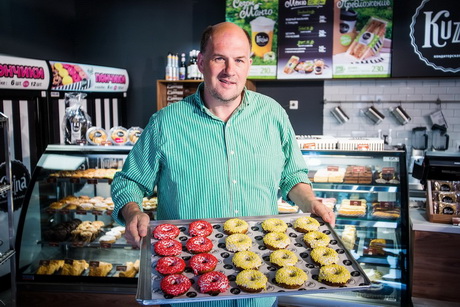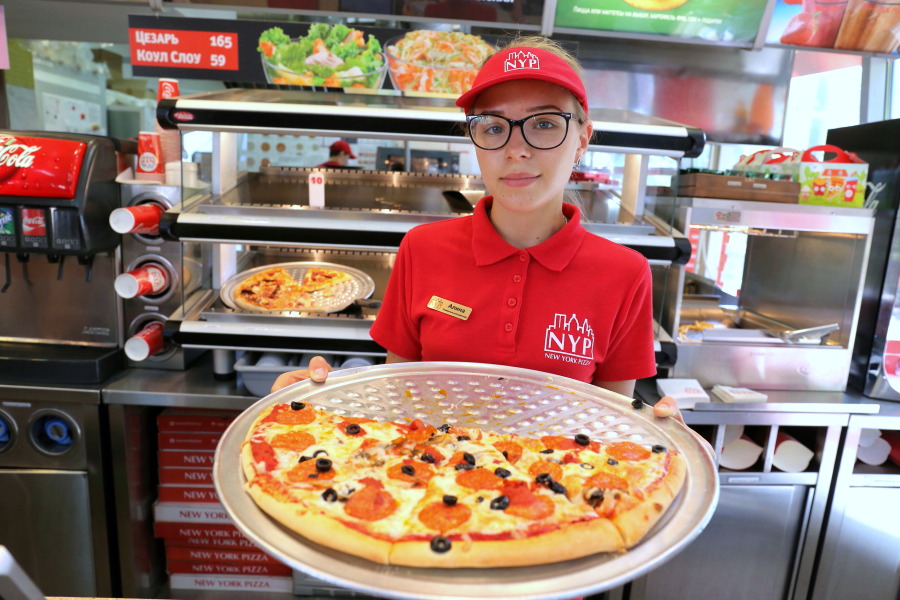
An American entrepreneur Eric Shogren first conquered Siberia with American pizza, now he’s bringing traditional Russian pastries on the US confectionery market. What he expects?
Banana bread and muffins, cakes and doughnuts with banana cream — banana stars in almost every item on the menu of a chain of pastry shops “Kuzina” in Novosibirsk, Russia. The creator of this chain, Eric Shogren, has to explain: his adventurous grandfather, an immigrant from Odessa, established a fruit market in the heart of Minneapolis. Eric was selling fruits together with him from early childhood. “I remember the banana aroma from boxes, crammed into my room, I could barely walk around there,” Eric recalled. When he grew up and opened his own pastry shops, Eric “blanketed” his products with bananas.
Shogren and his partner Yevgenia Golovkova run a federal chain of 30 pastry shops under the brand “Kuzina”. Eric came to Novosibirsk for the first time in 1992, when he was 25. He visited his brother Brad, who studied the Russian language at a local university. “The first thing that struck me in Russia was low prices for hockey pucks,” Shogren recalled “I could purchase a puck for several pennies and sell it in America for a dollar. It was madness! Of course, I took advantage of it,” he told. The puck business lasted for just a few months, after which Shogren found a more solid direction.
His brother introduced him to local businessmen, Eric started selling various Ford models with one of them, such as Mondeo, Taurus, Crown Victoria. The American-Russian duo worked like this: one of them flew to Minnesota, shipping cars to Russia via a ferry, the other was responsible for selling those cars in Russia. In a year the guys managed to earn several hundred thousand dollars. But then, the tandem fell apart, and the business came to an end.
Shogren decided to invest the earned funds into the opening of the first supermarket of American goods in Novosibirsk, Supervalu. His own resources were insufficient, and Eric invited his Russian friends-businessmen to take part in the project. In total, the opening of Supervalu cost $500,000. All products were brought from the United States — logistics was complicated and expensive, but the demand was at such a level that shelves stood empty in just a few days. “I realized that I made the mistake of relying solely on the purchase of foreign goods: delivery of the next batches took a lot of time, while we had nothing to trade in,” Eric said. After three months of inactivity the supermarket was closed. Shogren does not disclose how much his partners lost, “most of their investments”.
After the collapse of his retail project, Shogren went back to the United States. But a year later he decided to get back to Novosibirsk again. “Then, in the 1990s, I saw absolutely incredible opportunities for market development in Russia, there were a lot of talented and unclaimed people, untapped financial resources,” he recalled.
This time, Shogren decided to open the first American pizzeria in Novosibirsk. The entrepreneur brought part of the funds with him: he was able to convince his classmates in Minneapolis to become investors. “When I was returning to Russia, everyone was wondering what would happen next. But most looked at my idea with mistrust,” Shogren told.

He named his new project New York Pizza (NYP). The first pizzeria was opened in Novosibirsk in 1996. Later the entrepreneur opened a few more establishments in the same format — a snack bar New York Diner, a coffee shop New York Coffe, a bar New York Times.
And yet his investors-classmates worried for good reason. In 2008, Shogren faced the problem of insufficient funds: he had no money to settle with employees, suppliers and creditors. Next year he was even accused of fraud, associated with the help of a loan. The American got to a detention facility, where he stayed for a couple of days, until he was released on bail. Shogren eventually managed to pay the loan, and the charge was dropped.
“To keep the project alive, we had to completely reinvent it — change the location and go to large shopping malls, near other American brands, such as KFC, McDonald's, Subway. It helped us to attract new audiences,” told Yevgenia Golovkova, Eric’s partner. She met Shogren in the late 1990s, when she worked in a project on the delivery of humanitarian aid to Russia from the United States.
For 22 years, Eric Shogren and Yevgenia Golovkova managed to build a federal chain of 35 pizzerias in ten cities. They have only 8 pizzerias of their own, the rest are developed under franchises. Two years ago, NYP was opened in Moscow.
In the early 2000s, opening up another pizzeria in a shopping mall, Shogren caught himself thinking that the passion for American cuisine was gradually leaving Russia. By that time, Shogren already got married to Olga, a native of Novosibirsk, whom he met in Minneapolis, where his fiancee studied at a local university under a student exchange program.
“Olga introduced me to real Russian cuisine. Besides, I discovered an almost empty niche. Soviet canteens closed long ago, and no establishments in a new format were operating at the time. We decided to try,” Eric said.
The first diner in the free-flow format (meals are cooked non-stop, rather than for each new guest) was called “Kuzina” (Cousin — translated from Russian). It was opened in Novosibirsk in 2004, followed by four more.
A rapid development of the chain was interrupted during the crisis in 2008. “Purchase prices grew, while the demand fell, we had the only way out — to close our diners,” Shogren lamented. He closed the last Kuzina in 2008. “I wasn't sure then what we could get back to our feet,” the entrepreneur explained.
However, the partners restarted Kuzina in August 2010. “We decided to abandon a large-scale project but launch a chain of catering establishments with affordable food in Novosibirsk. The brand, already familiar to local residents, remained,” Golovkova said.
This time, Shogren and Golovkova focused on the format of a pastry shop with a wide range of coffee and fresh baked goods. The assortment includes salads, sandwiches, cereals, muffins, cakes, donuts, cookies, croissants, cinnamon rolls and various fillings — 120 positions. “Cinnamen is our own brand. It has become a hit in Novosibirsk,” Golovkova told.
The local hit is very similar to the world-famous Cinnabon, a chain, founded in 1985 by two Americans Greg and Richard Komenami in the State of Atlanta. They also bake cinnamon rolls, but it does not faze Golovkova, “There are no reason to fight over copyrights, our rolls are similar only when it comes to the name, but the recipe and how they are eaten are different: Cinnabon rolls are served warm and exclusively with cutlery, otherwise it is impossible to eat them. Our cinnamen can be eaten on the go, whether warm or cold,” she added.
Shogren agrees that there are other nuances, “Cinnabon rolls are baked from frozen semi-finished products, ours are cooked every morning and delivered fresh to our pastry shops.” The centralized production of confectionery products is carried out near the center of Novosibirsk, in a rented building of 2,000 sq m. More than 100 suppliers bring their products there — Kuzina uses over a thousand of ingredients.
As a result, Kuzina became a key asset for the American entrepreneur. Today there are 24 Kuzina pastry shops in Novosibirsk and 30 of them throughout Russia, including one in Barnaul and five in Moscow.
St. Paul that is across the river from Minneapolis is home to the largest university in the state. The first American Kuzina began working in the campus a few days ago.
The range is similar to Russian, only half as much — about 60 positions, according to Shogren.
“A lot of frozen cakes and pastries are sold in America, most of them are very simple, they have neither taste nor texture. That is why fresh “European” pastries are in great demand,” Shogren argues. “I am sure that Russian cakes would be welcome, especially because most people just don't know how to bake themselves,” he explained.
In the near future Shogren intends to complement the range of products with its own bread, including grain and rye. “Americans will pay well for healthy bread, because here it is mostly long-storage,” Shogren expects. The development of the bread direction lies with Olga Shogren, she completed a course in one of the culinary schools not so long ago.
Other experiments with the assortment are left for the future, when Shogren manages to grow a real chain from a small bakery. So far he has to compete with a variety of coffee shops in the almost three-million St-Paul, including on the campus. Maybe Shorgen, so used to Russian realities, will find it even more hard to develop his business at home. In Russia, his Kuzina shops got paid off in 2-2.5 years.


Comments (0)
Twitter
Facebook
Pinterest
E-mail